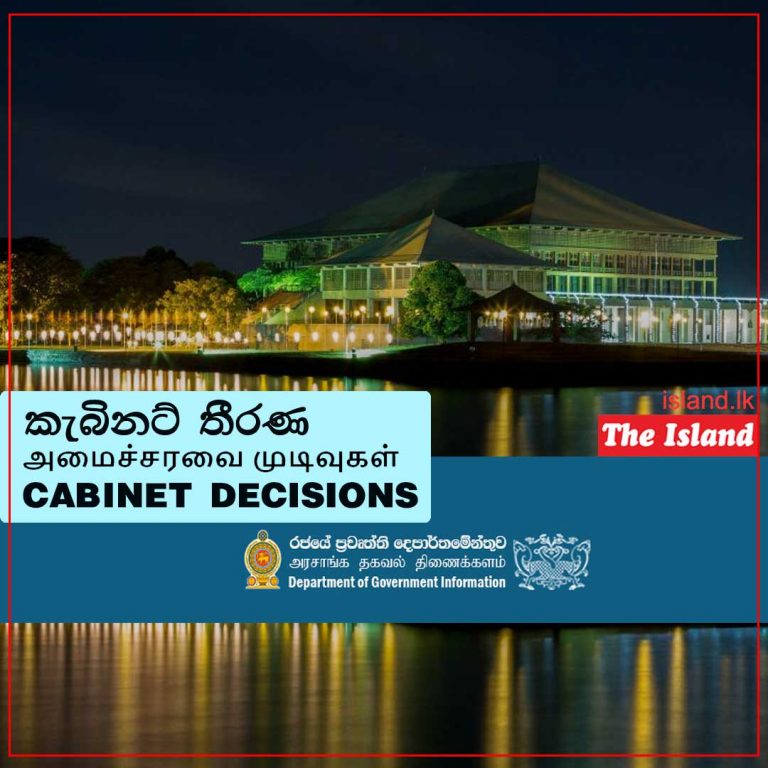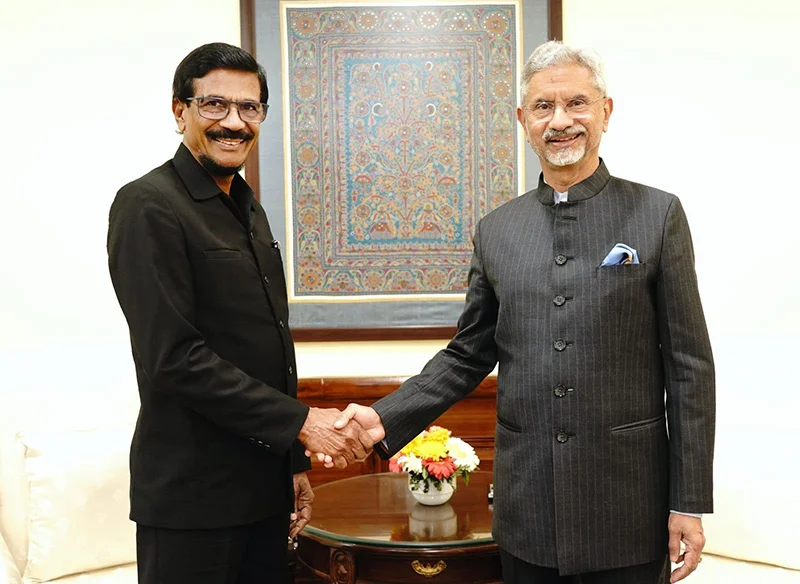News
Queen presided over Buddha Jayanthi 2500 celebrations as head of Ceylon

The statement made by President Ranil Wickremesinghe while participating in the vote of condolence on the demise of HM Queen Elizabeth II, moved in the Parliament today (23).
“Amongst all the letters of congratulations I received on becoming the president, the one that was sent by Her Majesty Queen Elizabeth II was special. It would have been one of the last letters of congratulations, if not her last letter of congratulations. Her Majesty has been very frail after the death of her husband, His Highness Prince Phillip the Duke of Edinburgh, but no one expected a sudden passing away like this.
The ceremonies are all over, but we have to grapple with the issue. What did Queen Elizabeth II mean to us, to Sri Lanka, to the United Kingdom, the Commonwealth and to the world. As Queen of Ceylon, her reign signified the transformation of our country from Ceylon to Sri Lanka. The great political upheaval started under her. The 1956 election victory, the emergence of the ethnic issue, the coming of the free education generation, the state control of the economy, two coup d’etat against the government and the start of the armed uprisings in the South.
Her Majesty is a person who is a staunch Christian and held to her beliefs as a defender of the Anglican faith. But as Queen of Ceylon she also upheld the commitment to safeguard Buddhism under the Kandyan Convention of 1815. In fact, a little known item is that HM presided over the Buddha Jayanthi 2500 celebrations as the head of Ceylon together with the kings of Thailand, Laos, Cambodia and the President of Burma as Myanmar was then known.
When her term came to an end and we became a republic, there were also two issues that we had left behind which has still not been resolved. The conversion from a dominion of Ceylon into a unitary state of the Republic of Sri Lanka was the emergence of the ethnic issues which led, in turn to uprisings and still the last part of it has to be resolved.
Secondly, it was an issue that was raised, about if you want a figurehead why don’t you have the queen? Why do you need a figurehead President? I remember the late Mr. Siriwardena, Editor of the ‘Aththa’ wrote an editorial that we need not become a republic to become a socialist country. Then there was the issue that was raised by the then leader of the Opposition Hon. J.R. Jayawardena supported by his Chief Opposition Whip Ranasinghe Premadasa as to why we need a figurehead president. If we are to have a president, we should have an Executive Presidency on the model of France.
Now this is also still an unresolved question. Many have pledged and won elections to abolish the executive presidency but no one has done it. In a sense, she represented not only the transformation of Sri Lanka but also the transformation of the rest of the world. The transfer of power from the West to Asia and Africa, the dismantling of the British Empire and the UK joining Europe, and then they left Europe and are now redefining its role as Global Britain.
Queen Elizabeth II was different. From Head of the British Colonies she became head of the Commonwealth of Nations, the transformation which represents her greatest success bringing together the West and the rest. This Commonwealth of Nations saw some of the most outstanding leaders of our time get together with HM the Queen. Sir Winston Churchill, Dame Margaret Thatcher, Pundit Jawaharlal Nehru, Sir Robert Menzies, Pierre Trudeau, Lester Pearson, Nelson Mandela, Kenyatta, Kenneth Kaunda, Nyerere, Nkrumah, Lee Kuan Yew and Tunku Abdul Rahman were amongst the others.
In this transformation, Queen Elizabeth II became to us a symbol of stability and a symbol of adaptability. No other queen would have jumped off a helicopter with James Bond. And she was a symbol of duty. As a global icon she outranked the UK, a nation which has now to charter its fortune without its greatest soft-power asset, Queen Elizabeth, who was 100 times more powerful than the aircraft carrier named after her.
It is to pay our respect to this global icon which took many of us to the funeral service in Westminster Abbey. It was a very moving funeral service. The most poignant moment became when all of us in the Abbey, Christian or non-Christian, joined in to sing her favourite hymn ‘The Lord Is My Shepherd’. ‘Goodness and mercy all my life shall surely follow me and in the god’s house for evermore my dwelling place shall be’. Queen Elizabeth II is no more. Therefore, I request, Hon. Speaker, and I am supporting the motion moved by the Hon. Prime Minister to convey to HM King Charles III and members of the Royal Family our condolences.
I conclude this tribute to Queen Elizabeth II of Ceylon, the last of our royal line which began with King Wijaya with this verse. “Anicca vata sankhara, uppadavaya-dhammino, Uppajjitva nirujjhanti, tesam vupasamo sukho.” Impermanence our formations subject to rise and fall, having risen they cease, their subsiding is bliss. Thank You.”
News
Cabinet approves construction of new 300 bed Base Hospital in Deniyaya

The Cabinet of Ministers approved the resolution forwarded by the Minister of Health and Mass Media to relocate the Deniyaya Base Hospital after constructing a new hospital with a capacity of 300 beds at an estimated cost of Rupees 6,000 million.
The Southern Provincial Department of Health has acquired a plot of land in Handford estate which is approximately 03 kilometres away from the town for this purpose.
News
Cabinet nod to legally empower methodology for implementing the ‘Praja Shakthi’ poverty alleviation national movement

The Cabinet of Ministers granted approval for the resolution furnished by the Minister of Rural Development, Social Security and Community Empowerment to instruct the Legal Draftsman to draft a bill to legally empower the implementation of ‘Praja Shakthi’ (Strength of the Community) poverty alleviation national movement
News
NPP not under Indian pressure to hold PC polls – JVP

…preliminary work started on new Constitution
JVP General Secretary Tilvin Silva yesterday (17) maintained that the NPP government was not under Indian pressure to hold the long delayed Provincial Council elections.
The top JVP official said so appearing on Sirasa Pathikada, anchored by Asoka Dias. Tilvin Silva said that neither the devolution nor terrorism issues had been discussed during his meeting with External Affairs Minister Dr. S. Jaishankar and Deputy National Security Advisor Pavan Kapoor, in New Delhi. This was Tilvin Silva’s first visit to India.
Declaring that politics hadn’t been on the agenda, the JVPer said that the Indian focus was entirely on economic development and technology.
The JVP General Secretary visited India under the Indian Council for Cultural Relations’ (ICCR) Distinguished Visitors Programme from 5-12 February 2026. General Secretary Silva was accompanied by Kitnan Selvaraj, MP, Ilankumaran Karunanathan, MP, JVP Central Committee Member Janaka Adhikari, JVP’s Media Unit Head Hemathilaka Gamage and Member of JVP’s International Relations Department Kalpana Madhubhashini. The delegation visited New Delhi, Ahmedabad and Thiruvananthapuram.
Responding to another query, Tilvin Silva said that Dr. S. Jaishankar had reiterated that India would always remain a true and trusted partner for Sri Lanka, in accordance with its ‘Neighbourhood First Policy’ and Vision ‘MAHASAGAR.’
Referring to the second JVP insurrection in the late 1980s, the JVPer claimed that they had not been against India but responded to the actions of the then Indian government.
Sri Lanka enacted the 13th Amendment to the Constitution in the wake of the Indo-Lanka peace accord of July 1987 to pave the way for Provincial Councils.
Tilvin Silva said that since they came to power, Indo-Sri Lanka relations had changed. “India has realised we could work together,” he said.
The JVP official said that preliminary work was underway, regarding the formulation of a new Constitution. The abolition of executive presidency and creation of an Office of President sans executive powers, too, would be addressed, he said, adding that the strengthening of the legislature was the other issue at hand.
Pointing out that the NPP had 2/3 majority in Parliament and could introduce a new Constitution on their own, Tilvin Silva said that they intended to obtain views of all and study the past processes in a bid to secure consensus. The JVP, as the party that campaigned against the introduction of executive presidency, way back in 1978, would lead the current effort to do away with the existing Constitution, he said.
Tilvin promised that they would implement what was in their manifesto.
The interviewer also raised the issue of abolishing the pensions for ex-Presidents. Tilvin Silva said that the Supreme Court, too, had approved the move to abolish pensions to ex-MPs. Therefore there was no issue with that, however, the ex-Presidents pensions couldn’t be done away with as they were made through the Constitution. That would be addressed when the government introduced a new Constitution in consultation with other stakeholders.
By Shamindra Ferdinando
-

 Life style3 days ago
Life style3 days agoMarriot new GM Suranga
-

 Business2 days ago
Business2 days agoMinistry of Brands to launch Sri Lanka’s first off-price retail destination
-

 Features3 days ago
Features3 days agoMonks’ march, in America and Sri Lanka
-

 Opinion6 days ago
Opinion6 days agoWill computers ever be intelligent?
-

 Features3 days ago
Features3 days agoThe Rise of Takaichi
-

 Features3 days ago
Features3 days agoWetlands of Sri Lanka:
-

 News3 days ago
News3 days agoThailand to recruit 10,000 Lankans under new labour pact
-

 News3 days ago
News3 days agoMassive Sangha confab to address alleged injustices against monks













